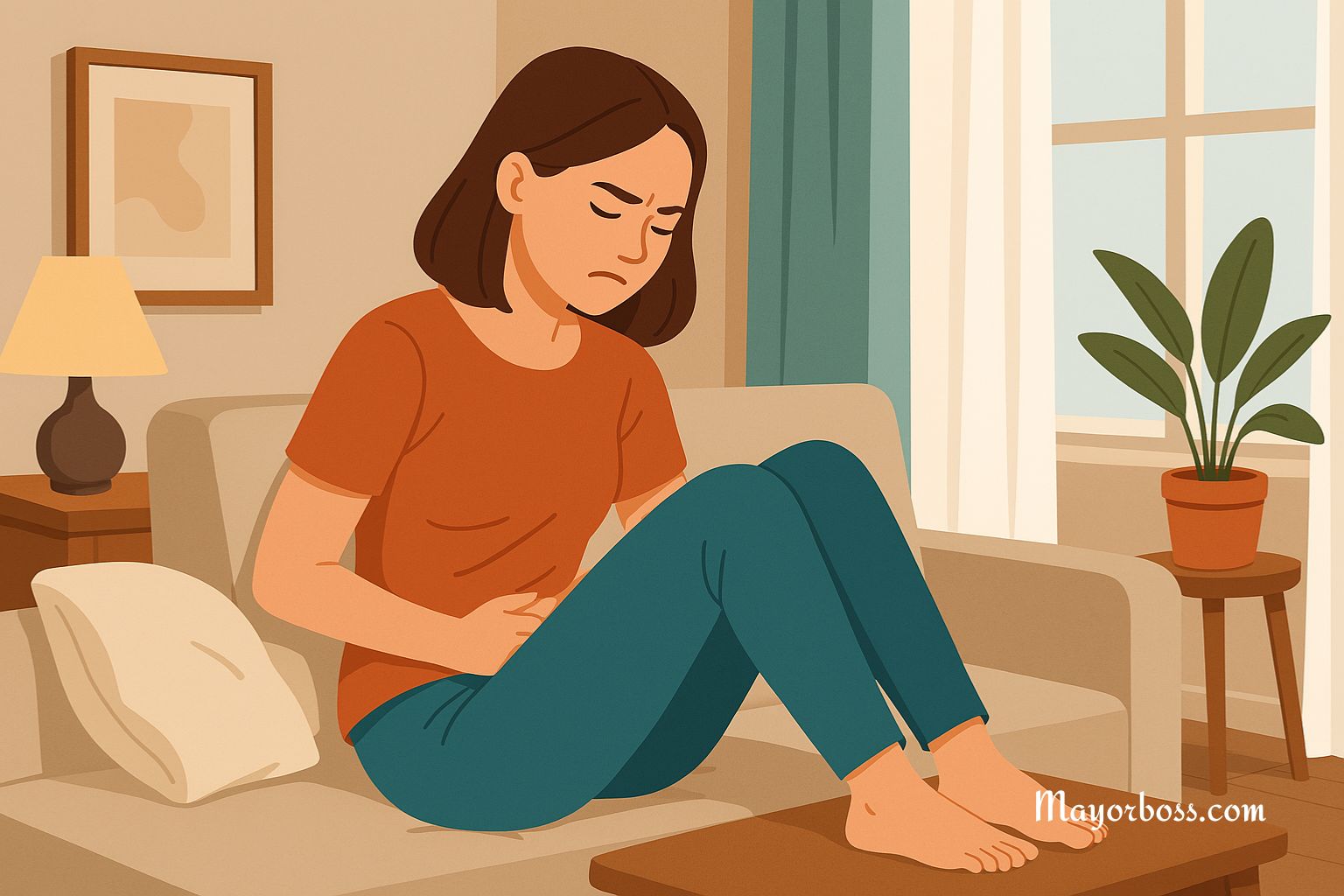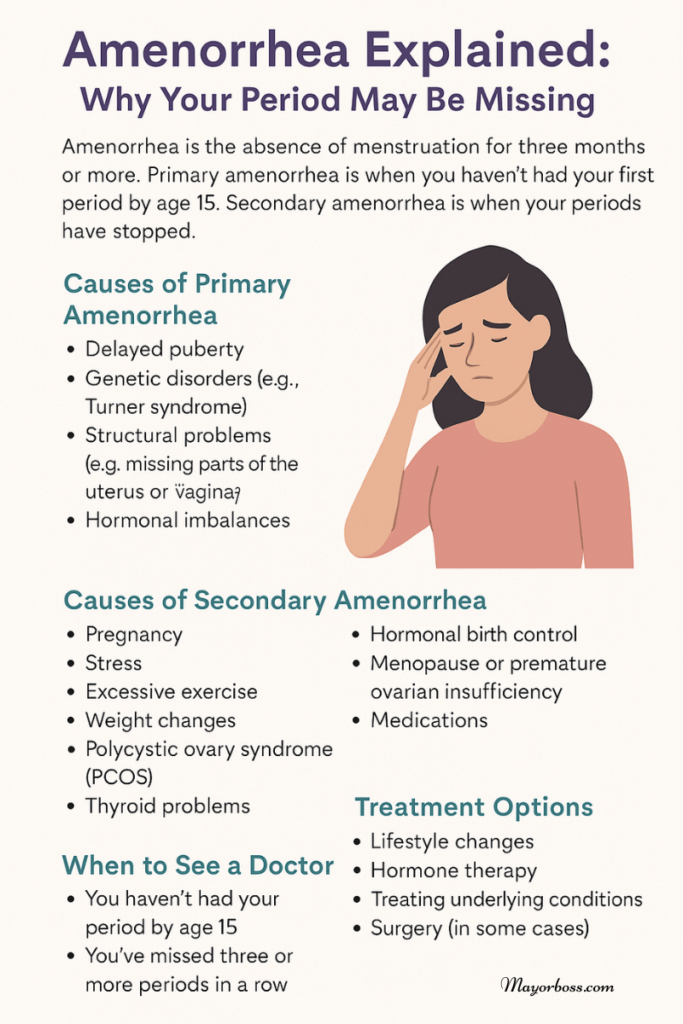Amenorrhea Explained: Why Your Period May Be Missing
Missing a period can cause worry, especially if it happens more than once. While pregnancy is the most common reason, it’s not the only one. Amenorrhea is the medical term for the absence of menstruation. Understanding why it happens can help you know when to seek care and what steps to take next.

What Is Amenorrhea?
Amenorrhea means you’ve missed your period for at least three months in a row, or you never had a period by age 15. It is not a disease but often a sign of another health issue.
There are two main types:
- Primary amenorrhea: You haven’t had your first period by age 15.
- Secondary amenorrhea: You had regular periods, but they’ve stopped for three months or more.
Both types need medical attention to identify the cause. (1)
Regular menstrual cycles are a key sign of reproductive health. Amenorrhea can increase the chance of infertility, low bone density, and other long-term complications if not treated properly. The earlier the cause is found, the easier it often is to treat.
Causes of Primary Amenorrhea
Primary amenorrhea often relates to problems with the reproductive organs, hormones, or genetic conditions. Some common causes include:
- Delayed puberty: Some girls naturally develop later than others.
- Genetic disorders: Turner syndrome and other conditions can affect how the ovaries work.
- Structural problems: Missing parts of the uterus or vagina can prevent menstruation.
- Hormonal imbalances: Issues with the hypothalamus or pituitary gland can stop ovulation.
If a teen hasn’t started menstruating by age 15 or hasn’t shown any signs of puberty by age 13, a doctor should evaluate the cause. (2)
Causes of Secondary Amenorrhea
When periods stop after having been regular, many possible reasons exist. These include:
1. Pregnancy
This is the most common reason. Always consider pregnancy first if you’re sexually active and your period is late.
2. Stress
Emotional or physical stress affects the brain’s control of hormones. The hypothalamus, which helps regulate the menstrual cycle, can become disrupted. In some cases, extreme stress may stop ovulation.
3. Excessive Exercise
Very intense workouts or endurance training can lower body fat and affect hormone levels. This is common in athletes and dancers.
4. Weight Changes
- Weight loss: Severe dieting or eating disorders like anorexia can shut down the menstrual cycle.
- Obesity: Extra body fat can affect how estrogen works in the body, leading to irregular or missed periods.
5. Polycystic Ovary Syndrome (PCOS)
PCOS is a hormone disorder that causes irregular ovulation. Many women with PCOS have long gaps between periods or none at all.
6. Thyroid Problems
An overactive or underactive thyroid can disturb hormone balance, affecting menstruation.
7. Hormonal Birth Control
Some women stop getting their periods while using birth control pills, injections, or implants. After stopping, it might take a few months for the cycles to return.
8. Menopause or Premature Ovarian Insufficiency
Menopause usually begins around age 45–55. If your period stops before age 40, this is called premature ovarian insufficiency and needs medical attention.
9. Medications
Certain medications, including antipsychotics, chemotherapy, and antidepressants, can interfere with the menstrual cycle.
When to See a Doctor
It’s important to see a healthcare provider if:
- You’re 15 and haven’t started menstruating.
- You’ve missed three or more periods in a row.
- You have other symptoms like severe acne, facial hair growth, hot flashes, or vision changes.
These signs may point to underlying hormone imbalances or other medical issues that need evaluation.
How Is Amenorrhea Diagnosed?
A doctor will start with a detailed medical history and physical exam. You may be asked about your diet, if you are sexually active, exercise, stress, how heavy or light are your periods, and family history. (3) Tests may include:
- Pregnancy test
- Blood tests to check hormone levels
- Pelvic ultrasound to look at the uterus and ovaries
- MRI or CT scan if a brain or pituitary issue is suspected
Treatment
Treatment depends on the cause. The goal is to restore regular cycles and prevent long-term effects like bone loss or infertility.
- Lifestyle changes: Eating enough, managing stress, and moderating exercise may be enough in some cases.
- Hormone therapy: Doctors may use estrogen, progesterone, or thyroid medications to restore balance.
- Treating underlying conditions: For PCOS or thyroid disorders, specific treatments can help bring periods back.
- Surgery: In rare cases, surgery may be needed for structural problems.

Final Thoughts
Missing a period once may not mean something serious. But if your cycle stops for several months, don’t ignore it. Amenorrhea is your body’s way of saying something may not be right. Talking with a gynecology provider is the first step to understanding what’s happening and how to fix it.
